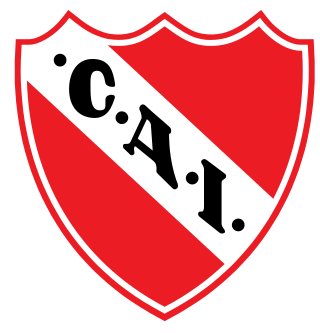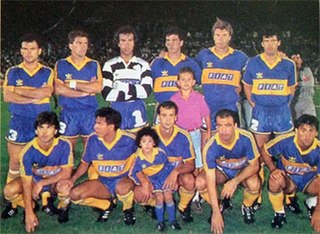
The CONMEBOL Libertadores, also known as the Copa Libertadores de América, is an annual international club football competition organized by CONMEBOL since 1960. It is the highest level of competition in South American club football. The tournament is named after the Libertadores, the leaders of the Latin American wars of independence, so a literal translation of its former name into English is "America's Liberators Cup".

Atlético Nacional S. A., best known as Atlético Nacional, is a Colombian professional football club based in Medellín. The club is one of only three clubs to have played in every first division tournament in the country's history, the other two teams being Millonarios and Santa Fe.

Club Atlético Independiente is an Argentine professional sports club, which has its headquarters and stadium in the city of Avellaneda in Greater Buenos Aires. The club is best known for its football team, which plays in the Primera División and is considered one of Argentina's Big Five football clubs.

The CONMEBOL Sudamericana, named as Copa Sudamericana, is an annual international club football competition organized by CONMEBOL since 2002. It is the second-most prestigious club competition in South American football. CONCACAF clubs were invited between 2004 and 2008. The CONMEBOL Sudamericana began in 2002, replacing the separate competitions Copa Merconorte and Copa Mercosur by a single competition. Since its introduction, the competition has been a pure elimination tournament with the number of rounds and teams varying from year to year.

The CONMEBOL Recopa Sudamericana, known also as the Recopa Sudamericana or CONMEBOL Recopa, and simply as the Recopa, is an annual international club football competition organized by CONMEBOL since 1988. It is a match-up between the champions of the previous year's Copa Libertadores and the Copa Sudamericana, South America's premier club competitions.
The Supercopa Libertadores, also known as the Supercopa Libertadores João Havelange, Supercopa João Havelange or simply Supercopa, was a football club competition contested annually between 1988 and 1997 by the past winners of the Copa Libertadores. The tournament is one of the many South American club competitions that have been organized by CONMEBOL.

The Copa de Oro, or Copa de Oro Nicolás Leoz, was a football cup winners' cup competition contested on 3 occasions by the most recent winners of all CONMEBOL continental competitions. These included champions of the Copa Libertadores, Supercopa Sudamericana, Copa CONMEBOL, Supercopa Masters and Copa Masters CONMEBOL. The Recopa Sudamericana champions did not participate. The cup is one of the many continental club competitions that have been organized by CONMEBOL. The first competition was held in 1993 featuring the 4 major continental champions of the previous season whilst the second competition in 1995 two continental champions declined to play leaving only two participants to play. In the final edition in 1996, all the continental champions accepted the invitation to play. Boca Juniors, Cruzeiro and Flamengo were the only winners of the tournament with one title each. Brazil became the most successful nation of the competition with two victories.
Christian Lionel Díaz is an Argentine football manager and former player who played as a left back. He is the current manager of Bolivian club Jorge Wilstermann.

Ricardo Alberto Gareca Nardi, nicknamed el Tigre and el Flaco, is an Argentine football manager and former player. Gareca was the manager of the Peru national team from 2015 to 2022.
1988–89 in Argentine football saw Independiente win the Argentine championship. In the international competitions there were two editions of the Copa Libertadores, the best performance came from Newell's Old Boys who were runners up in the Copa Libertadores 1988. Racing Club were the inaugural champions of the Supercopa Sudamericana, their first championship of any description since 1967.
The Copa Libertadores remains the most prestigious competition in South America for clubs, and the Primera División Argentina was the most successful league in the cup's history, having won the competition 24 times; Independiente has a record seven wins, followed by Boca Juniors with six, Estudiantes (LP) and River Plate with four, while Racing Club, Argentinos Juniors, Vélez Sarsfield and San Lorenzo have one apiece.

The Copa Argentina, officially known as the "Copa Argentina AXION energy" due to sponsorship reasons, is an official football cup competition organized by the Argentine Football Association (AFA), with the aim of qualifying one club to the Copa Libertadores.

The Copa Libertadores is the most important international football club competition in South America. Throughout the history of the tournament, 25 teams from seven countries have won the competition. Its rich history has been saturated with many legendary matches, iconic players and exceptional teams; from Peñarol's historical consecration in 1960, to Coutinho and Pelé enchanting the world with Santos's magical football, down to Estudiantes's unlikely success at the end of the 1960s, and Club Atlético Independiente being brought to glory in the utmost manner.
This page details the records and statistics of the Copa Libertadores. The Copa Libertadores is an international premier club tournament played annually by the top football clubs of South America. It includes 3–5 teams from all ten CONMEBOL members plus Mexico, whose clubs are sometimes invited as guests to the tournament. It is now held from January to November and it consists of eight stages.
The 2015 Copa Libertadores de América was the 56th edition of the Copa Libertadores de América, South America's premier club football tournament organized by CONMEBOL.

The 1989 Supercopa Libertadores Finals was a two-legged football series between Independiente and Boca Juniors to decide the 1989 Supercopa Libertadores champion. The matches were played on November 22 and November 29 of that same year.
The involvement of Clube Atlético Mineiro in international club football began in 1972, the year of its first appearance in an official competition at that level. Since then, the Brazilian club, based in Belo Horizonte, Minas Gerais, has participated in 31 continental and one intercontinental tournament. Atlético Mineiro has won four official titles at the international level: the Copa Libertadores in 2013; the inaugural edition of the Copa CONMEBOL in 1992, and again in 1997; and the Recopa Sudamericana in 2014. In addition, the club finished as runner-up of the Copa CONMEBOL in 1995, the Copa de Oro in 1993, and the Copa Master de CONMEBOL in 1996.

Club Atlético Independiente has success at the Argentine football level, but they are widely known for their international titles and appearances, being nicknamed Rey de Copas by the media and his fans. The first international cup they took part was the 1917 Tie Cup, which they lost to Uruguayan team Montevideo Wanderers. In term of international honours, Independiente has won a total of twenty one official titles, with 18 of them organised by CONMEBOL which makes Independiente the most winning team in this category, together with Boca Juniors. Among those international CONMEBOL titles Independiente has a record seven Copa Libertadores, two Intercontinental Cups, two Copa Sudamericana and one Recopa Sudamericana. International titles also include two Copa Aldao, organised by AFA and AUF together.

Boca Juniors is an Argentine professional football club based in Buenos Aires. The club first participated in a South American competition in 1919. The first international cup they took part in was the Copa Aldao in which they participated as champions of Argentina. The club competed in AFA/AUF cups from 1919 to 1946 and since entering the Copa Libertadores, in 1963, the club has competed in every CONMEBOL-organized competition, except the Copa CONMEBOL, Intercontinental Champions' Supercup, Suruga Bank Championship, Copa Merconorte, Copa Master de CONMEBOL and Copa Ganadores de Copa, most of them are extinct.











